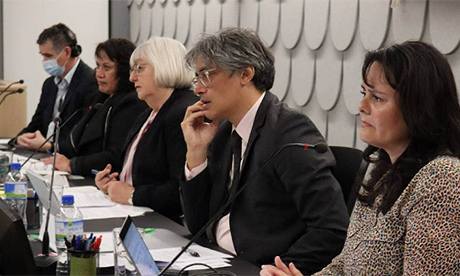The Catholic Church in New Zealand has pledged to implement the recommendations of the Royal Commission of Inquiry into Historical Abuse in State Care and Faith-based Institutions. – Originally reported 30 September 2024
On 27 September, in the most detailed statement to date from any Church or the State, Catholic Church leaders expressed deep regret and committed to concrete actions to address the systemic failures that contributed to the abuse.
“We are deeply sorry to victims and survivors, as well as their whānau” stated Bishop Steve Lowe, President of the New Zealand Catholic Bishops Conference, and Fr Tom Rouse, President of the Congregational Leaders Council.
“We know that words alone are not enough; we must demonstrate our apology by taking responsibility and through concrete actions.”
Tight timeline
The Royal Commission’s final report required responses within a tight two-month timeline.
While accepting 70 percent of the Commission’s findings, the Church could not fully accept some.
Acknowledging the timeline constraints, Lowe and Rouse said that the Church would continue assessing the findings and provide a more comprehensive response in due course.
Church use of psychological assessment
One critical area highlighted in the report was the Church’s reliance on psychiatric evaluations to determine whether abusers could be rehabilitated.
While the Church agreed that reliance on psychiatric advice led to some offenders being reassigned to new roles, it defended this practice as being “best practice” at the time.
The Church admitted that “with hindsight, much of the professional psychiatric advice it received was incorrect”.
However, the Church notes that it continues to recognise that medical professionals’ opinions remain part of the process in contemporary responses to professional misconduct or abuse.
Forgiveness over safeguarding
The report also criticised the Church’s tendency to prioritise forgiveness over safeguarding and accountability.
The Church acknowledged that there was a tendency to regard abusive behaviour as a “moral failure” rather than recognising its psycho-sexual nature.
Statistics differ
In its report, the Royal Commission stated that a higher proportion of survivors were in faith settings than in State care.
The religious leaders disputed some statistical claims, particularly the ‘higher proportion’ claim.
“Our own research presents a different perspective” the Church stated, underlining a discrepancy in the interpretation of data.
It said further work would need to be done to make an adequate comparative analysis.
Inadequate training
The Church acknowledged its historical failures in training those responsible for the care of children and vulnerable adults.
It admitted that inadequate training and a lack of understanding contributed to the harmful environment in the past.
However, by the 1990s, the Church began actively encouraging disclosures of abuse and, more recently, mandatory police vetting and safeguarding training have been implemented for all those involved with children and vulnerable adults.
Power imbalance
In response to the Commission’s finding that there is a power imbalance between religious, clergy and parishioners, the Church acknowledged this.
It noted an imbalance is inherent in the relationship between clergy and parishioners, particularly during the period examined by the Inquiry.
Slow to change
In response to the Royal Commission’s criticism that the Church was slow to implement changes to prevent abuse, Lowe and Rouse pointed out that some Catholic entities were “developing responses and implementing changes on par with or even ahead of state-based institutions”.
They reiterated their commitment to addressing past failures and improving current practices to ensure accountability and healing.
Lowe and Rouse echoed recent comments from Palmerston North Bishop John Adams that the Church had made changes.
They reinforced the Church’s pledge to be part of a broader, community-wide effort to use the report’s findings as a catalyst for change.
Source
- Supplied NZCBC
News category: New Zealand, News Shorts.







